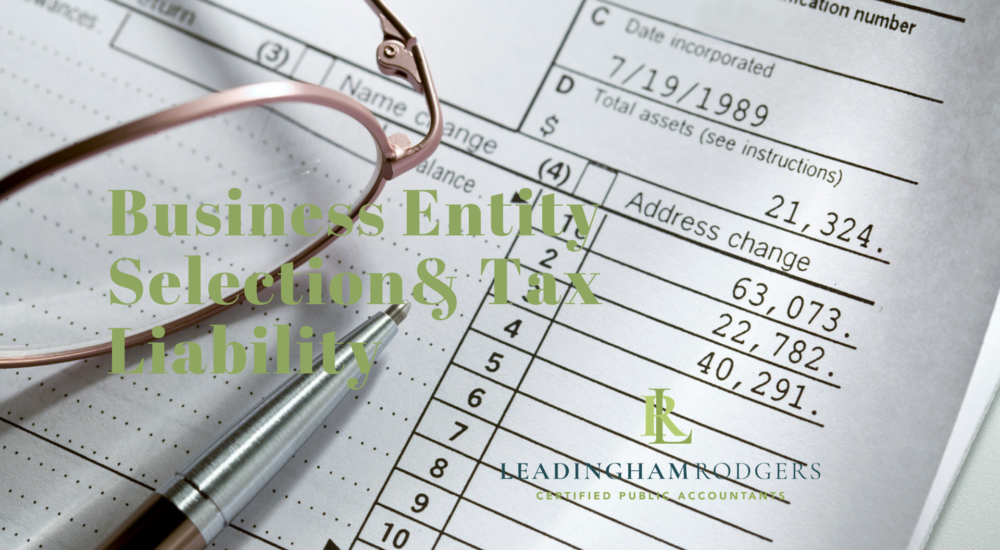Corporate philanthropy is about more than limiting your tax burden. Giving to organizations in your…

Estate Planning Basics – How a CPA Can Help
The term “estate planning” may have an old world, old money ring to it, but that doesn’t mean it’s for the affluent alone.
Anyone with end-of-life medical concerns or fears over the transfer of assets should consider drawing up a detailed estate plan rather than relying on a comparatively simple last will.
Far more comprehensive than a will, a fully realized estate plan can ensure your legacy in two crucial ways: one, the maximum value of your assets are transferred to those listed in your will; and two, in the event of a medical emergency or incapacitation, your or your chosen proxy’s legal authority will be preserved . Best of all, a detailed estate plan provides you a comprehensive peace of mind about the future wellbeing of your loved ones.
Leadingham Rodgers’ CPAs have helped countless individuals safeguard their legacies through detailed estate planning. Under the guidance of an expert CPA, and with a few simple basics in mind, you can optimize your legacy for generations to come.
Consider Your Wishes
Planning for the end of life is seldom comfortable or pleasant, but by thinking about several hard issues ahead of time you can guarantee an orderly transition for your family.
Among these determinations are: assigning power of attorney, assigning durable financial power of attorney, drafting a legal will, granting family members access to medical records, designating beneficiaries, and deciding guardianship for dependents.
Many of these roles will be occupied by the same person, usually a spouse, partner, parent, or child. Make sure to ask for their consent before naming them in any legal documents.
Consider Your Assets
For the greatest possible transfer of assets to your loved ones, you’ll want to conduct a thorough review of all assets in your name, which includes every penny, property, stock, bond, bank account, and insurance policy.
Assets without named beneficiaries (or “probate assets”) may be contested after the fact, leading to expensive, prolonged, and ultimately unpleasant public legal proceedings. In the interest of your family, and to preserve the most of your life’s legacy, it’s important to leave no stone unturned in pursuit of every last asset.
Digital assets (e.g. access to social media accounts, digital storage such as Bitcoin, and other electronic records) also require a named beneficiary. Without naming a beneficiary, access to your digital assets may be lost forever.
Consider Trusts
Now that you’ve tallied your assets and named beneficiaries, you’ll need to think about how those assets are distributed.
Firstly, the lump sum transfer of assets may incur significant estate taxes or income taxes. A CPA can help you determine which of your assets are at greatest risk for taxation ahead of time.
Secondly, you might consider how these assets will be used by the named beneficiaries themselves. If you have doubts or reservations about the future of your assets, you may want to consider a trust.
By placing assets into legal trusts, you can dictate certain conditions over the usage of those assets. Through a trust, you can make sure that certain assets are mature before being sold. You can also make sure that the assets you leave behind accomplish the greatest good for the people you love.
Consider your Legacy
You’ve worked hard, made a name for yourself, and accomplished great things for your family. But without a detailed estate plan, some of your assets and end-of-life legal concerns may cause more harm than good.
When it comes to the future of your family, only the utmost specificity and legal determination will do. By contacting a CPA and beginning your estate planning today, you ensure that your life’s achievements reverberate for generations to come.
Start estate planning today with a CPA from Leadingham Rodgers!
A trusted team of legal and financial advisors can help you craft an ironclad estate plan from start to finish. In the best interest of your family and loved ones, consider your legacy and how you’d like your assets to be used. Avoid family rifts by preventing litigation and taking absolute control of your cherished legacy by calling (334) 270-3366 today!



